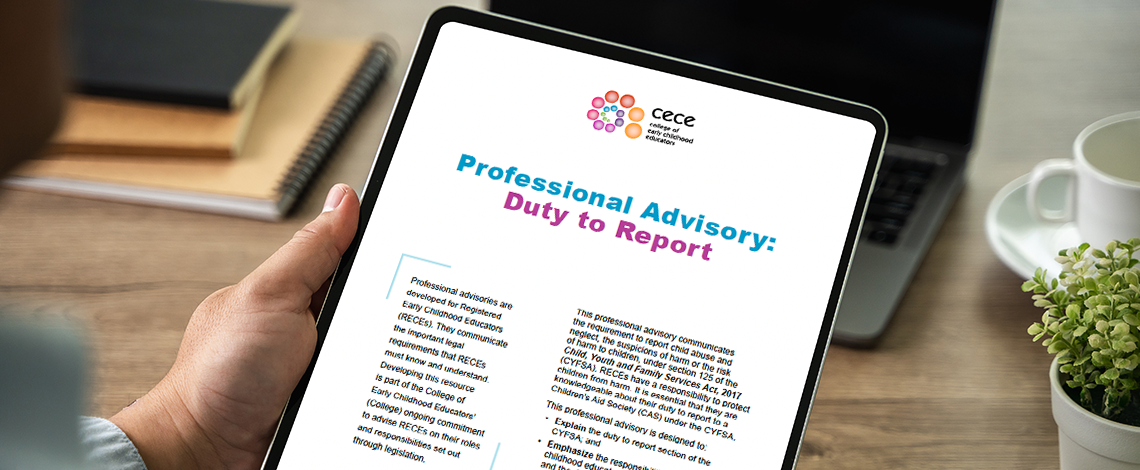As a Registered Early Childhood Educator (RECE), you prioritize the safety, well-being and care of children through caring and responsive relationships. One of your key responsibilities is to protect children from harm. Under section 125 of the Child, Youth and Family Services Act, 2017 (CYFSA), RECEs have an immediate duty to report to a CAS if they have reasonable grounds to suspect that a child has been harmed or is at risk of harm or injury.
To support members in understanding their legal duty to report under the CFYSA, the College has released a newly revised Professional Advisory: Duty to Report based on feedback from both members and stakeholders.
“Given the knowledge and skills of RECEs and the relationships they form with children, families and colleagues, they’re in a unique position to recognize possible signs of child abuse, neglect and family violence. This updated professional advisory deepens our support to members, who asked for additional guidance about their legal duty to report. We’ve also included practical strategies and more information for RECEs to consider, such as the influence of beliefs and bias on a professional’s decision to report to CAS.”
~Melanie Dixon RECE, Director of Professional Practice at the College of Early Childhood Educators
The revised Professional Advisory: Duty to Report:
- introduces the CYFSA and explains section 125 in the context of an RECE’s practice;
- examines reasonable grounds, professional judgment and ethical decision-making around reporting;
- describes reportable harms, risks and circumstances;
- covers consequences of not reporting;
- highlights bias, racism and stereotypes in relation to the duty to report; and
- provides guidance for RECEs related to their role and the duty to report.
The updates to the Advisory also cover important considerations before and when making a report, such as:
- Using your professional judgment and engaging in ethical decision-making will support you when considering whether a child is or may be at risk of harm. Read pages 6-7 of the professional advisory for recommended steps.
- Knowing that your duty is to report concerns, while the duty of a CAS is to investigate.
- Understanding you can contact a CAS at any time, not just to report, but also for a consult or to ask questions.
Failure to report concerns of harm or abuse towards children is contrary to the law and may constitute professional misconduct.
RECEs may experience emotional stress when taking steps to report to the CAS, and in maintaining a trusting relationship with the family or colleague who was reported. To manage this stress, the professional advisory also offers strategies and tactics to care for yourself. Learn more in the ‘After reporting to a CAS’ section on page 23.
Determining whether a child is at risk of harm can be complex. To support members with reflection and discussion on this important topic, the College has also updated the Reflection Guide on Duty to Report. It includes six new scenarios and an ethical decision-making framework to guide members. This provides members with the opportunity to consider scenarios with colleagues, which can help you examine your beliefs, past experiences and the contextual factors that inform decisions related to the duty to report.
Please take the time to review and reflect on these updated resources. They can be found here.

